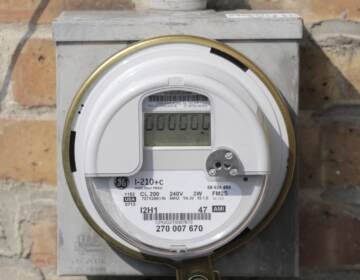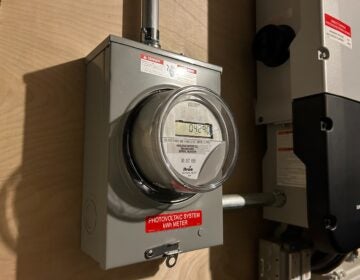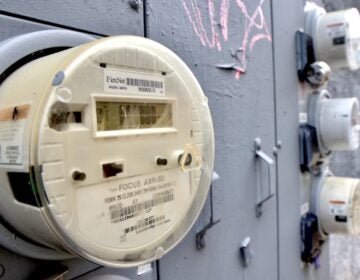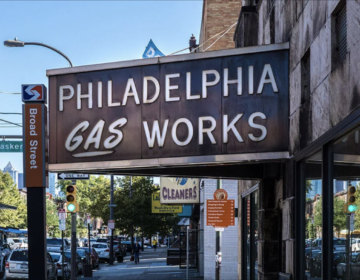A Pa. utility shutoff law is expiring. Here’s what you need to know
A state law governing utility termination expires Dec. 31. But the winter shutoff moratorium stays in effect.
Listen 1:02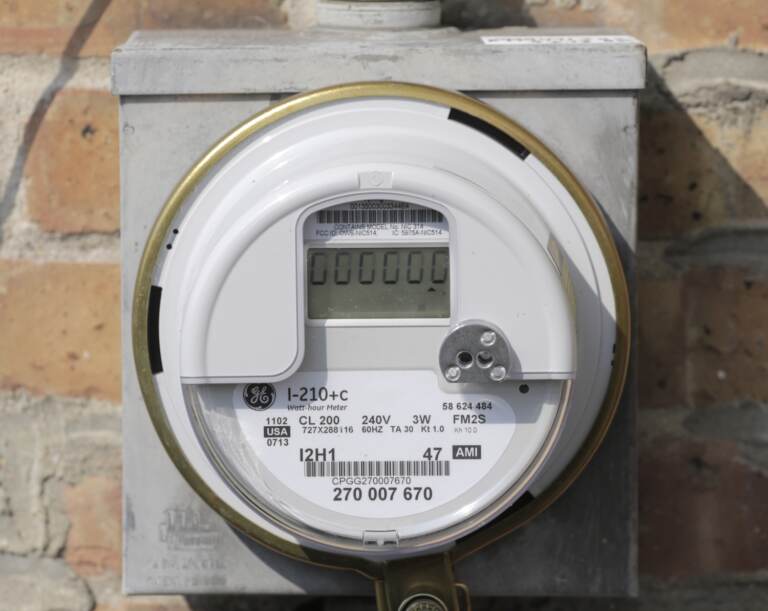
A utility meter is seen in a file photo. (AP Photo/M. Spencer Green)
Have a question about Philly’s neighborhoods or the systems that shape them? PlanPhilly reporters want to hear from you! Ask us a question or send us a story idea you think we should cover.
A Pennsylvania law that lays out how and when utility companies can shut off customers’ electricity, gas or water expires Dec. 31.
But the state’s ban on shutoffs for low-income customers during the winter months and other protections will continue uninterrupted.
“The message that we’ve been hoping that people really hear is not to panic,” said Elizabeth Marx, executive director of the Pennsylvania Utility Law Project.
Utility shutoffs are an experience many Pennsylvania households deal with. In the first 10 months of 2024, utilities in the state disconnected more than 300,000 households and reconnected fewer than three-quarters of them.
In Philadelphia, one in four low-income households spends at least 16% of its income on energy bills — an energy burden that’s considered severe. Black and Hispanic households in Philadelphia spend more of their income on energy than households overall, and national surveys have shown non-Hispanic Black and Hispanic households are disconnected from utility service at higher rates than non-Hispanic white households.
Here’s what you need to know about the sunsetting statute.
Pa.’s ban on shutoffs for low-income customers during the winter continues
Pennsylvania’s winter shutoff moratorium will continue even after the law expires, because this and other protections are duplicated in another part of state code.
Between the frigid months of December through March, public utilities in Pennsylvania are restricted from terminating low-income customers’ service for nonpayment without permission from the Public Utility Commission.
Water utilities cannot terminate heat-related service during this time period.
Gas and electric utilities cannot terminate service for households earning below $3,137 monthly for an individual or $6,500 for a family of four, based on the 2024 federal poverty guidelines.
“We understand the importance of these protections to Pennsylvanians and remain committed to balancing the needs of consumers and utilities,” said Stephen DeFrank, Pennsylvania Public Utility Commission chairman, in a statement.
There is a partial exception for city gas utilities, which can terminate service for households earning $1,882 to $3,137 monthly for an individual or $3,900 to $6,500 for a family of four, during part of the winter under certain circumstances.
If you can’t pay your utility bills in full, Marx recommends making at least some payment, because utilities consider a positive payment history when setting up payment plans.
“Paying what you can, when you can, is very important, especially even through the winter, when the winter moratorium is in place,” she said.
Medical certificates still protect customers from shutoffs
Pennsylvania households with a member going through a serious illness or with a health condition that requires utility service can get a medical certificate, which protects them from a shutoff for a renewable 30-day period.
This protection will also remain intact into 2025.
You can’t be shut off on a weekend or a holiday
State code bars Pennsylvania utilities from terminating customers’ service because of nonpayment on Fridays, Saturdays, Sundays, holidays and the day before holidays. This is to ensure customers can arrange for their service to be restored the day after they’re shut off.
This requirement will also continue past the expiration of the law.
PUC payment arrangements stay the same
When a customer is unable to keep up with a payment arrangement issued by their utility to cover overdue bills, the state Public Utility Commission can establish one alternative payment arrangement between the customer and utility.
While utilities have flexibility to negotiate the length of payment arrangements with customers, the law that’s expiring sets specific timelines for the PUC-issued arrangements, based on a customer’s income. These mandated pay-back periods, which range from six months to five years, do not take into account the total amount a customer owes — so the monthly payment can be too high for customers to pay, putting them at risk of termination again, consumer advocates say.
Without the law in effect, the PUC could exercise more discretion to set up custom repayment plans based on households’ individual circumstances.
But in a motion approved by the PUC earlier this month, PUC Chairman Stephen DeFrank, a former lobbyist for several PUC-regulated utilities, argued the commission should maintain the status quo in regards to payment arrangements. DeFrank said in a statement the PUC’s goal is providing clarity and stability, as well as “fostering fair outcomes for consumers and utilities alike.”
The PUC plans to continue to issue payment arrangements with the following terms:
- Five years for customers with a gross monthly household income at or below $1,882 for an individual or $3,900 for a family of four in 2024.
- Three years for customers with a gross monthly household income of $1,882 to $3,137 for an individual or $3,900 to $6,500 for a family of four.
- One year for customers with a gross monthly household income of $3,137 to $3,765 for an individual or $6,500 to $7,800 for a family of four.
- Six months for customers with a gross monthly household income over $3,765 for an individual or $7,800 for a family of four.
If you need to set up a payment arrangement to pay overdue bills, Marx recommends starting by talking to an employee at your utility, being transparent about your ability to pay and only agreeing to a payment arrangement that you can afford — because a failed payment arrangement can count against you in the future.
“One thing that a lot of folks don’t know is that they don’t have to take the first payment arrangement offered by a utility,” Marx said.
Additional shutoff protections failed to make it through the legislature
The law that’s expiring at the end of the year was originally enacted in 2004 for a 10-year period. It was reauthorized in 2014, and set to be reauthorized again this year. But lawmakers couldn’t agree on a replacement.
Advocates for low-income utility customers hope to see more protections added to the law in the future.
Joline Price, a lawyer at Community Legal Services who represents people struggling to pay utility bills, wants to see changes including longer shutoff protections for people with medical conditions, a ban on shutoffs during the hot summer months, PUC payment arrangements based on a customer’s ability to pay, elimination of charges like reconnection fees and a requirement for shutoff notices to be sent in multiple languages.
Termination rules should focus on preventing people from falling behind on their bills in the first place, Marx said.
“We need new tools in the toolbox to handle rising utility debt,” she said.

Get daily updates from WHYY News!
WHYY is your source for fact-based, in-depth journalism and information. As a nonprofit organization, we rely on financial support from readers like you. Please give today.




